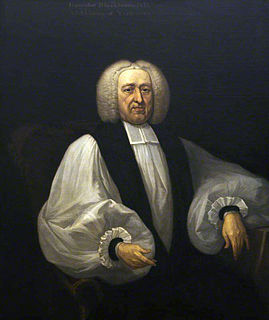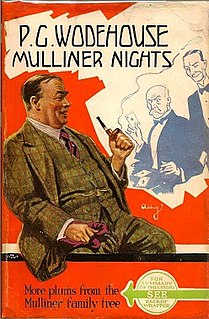
William Gulston [1] (1636-1684) was an English churchman, bishop of Bristol from 1679.

William Gulston [1] (1636-1684) was an English churchman, bishop of Bristol from 1679.
Son of Nathaniel Gouldston D.D. of Wymondham, Leicestershire, he was educated at Grantham and was admitted sizar at St John's College, Cambridge in 1653. He graduated B.A. in 1658, M.A. in 1661, and D.D. in 1679. [2]
Gulston was presented to the Church of St Faith, Havant in 1660 by the king. John Belchamber who had had the living under the Commonwealth was, however, reinstated in 1662. [3] He was rector of Symondsbury, Dorset from 1670. As chaplain to Sarah, Duchess of Somerset, he became a protégé of Henry Somerset, 3rd Marquess of Worcester, a proto-tory, and became immersed in the city local politics of Bristol. After two years his position had become difficult. [4]
He died on 4 April 1684 at Symondsbury and was buried there.
His daughter Mary married Gilbert Budgell D.D., and was mother of Eustace Budgell. He was uncle to Joseph Addison, his sister Jane having married Lancelot Addison. [5] [6]
| Church of England titles | ||
|---|---|---|
| Preceded by Guy Carleton | Bishop of Bristol 1679–1684 | Succeeded by John Lake |
The Reverend Lancelot Addison was an English writer and Church of England clergyman. He was born at Crosby Ravensworth in Westmorland. He was educated at the Queen's College, Oxford.

Eustace Budgell was an English writer and politician.

Lancelot Blackburne was an English clergyman, who became Archbishop of York, and – in popular belief – a pirate.

Mulliner Nights is a collection of short stories by P. G. Wodehouse. First published in the United Kingdom on 17 January 1933 by Herbert Jenkins, and in the United States on 15 February 1933 by Doubleday, Doran. The stories in the collection were originally published in magazines in the UK and the US between 1930 and 1932.

Sir Jonathan Trelawny, 2nd Baronet, of Trelawny in the parish of Pelynt in Cornwall, England, was a Member of Parliament.
Gulston Addison was the President of Madras, India from 18 September 1709 to 17 October 1709. He was the younger brother of the famous essayist Joseph Addison, and the second son of Rev. Lancelot Addison.

Francis Turner D.D. was Bishop of Ely, one of the seven bishops who petitioned against the Declaration of Indulgence and one of the nine bishops who refused to take the oath of allegiance to William III.
Robert Butts (1684–1748) was an English churchman and strong partisan of the administration of Sir Robert Walpole, successively Bishop of Norwich and Bishop of Ely.
Henry Glemham (Glenham) was an English royalist churchman, Dean of Bristol and Bishop of St Asaph.
Simon Lowth (1636–1720) was an English nonjuring clergyman, nominated by James II as Dean of Rochester, and later a controversialist on the position of bishops.

Gilbert Ironside the younger was an English churchman and academic, Warden of Wadham College, Oxford from 1667, Bishop of Bristol and Bishop of Hereford.

George Oxenden was an English academic, lawyer and politician who sat in the House of Commons from 1695 to 1698.

Lewis Atterbury the younger LL.D., (1656–1731) was an English churchman, a royal chaplain to two monarchs.
John Every was an English landowner and politician who sat in the House of Commons in 1679.
Sir Robert Booth (1626–1681) was an English-born judge who had a highly successful career in Ireland, where he held the offices of Chief Justice of the Irish Common Pleas and Lord Chief Justice of the King's Bench in Ireland.
Sir William Bassett was an English landowner and politician who sat in the House of Commons between 1669 and 1693.

William Sheridan was a 17th-century Irish clergyman, who was Bishop of Kilmore and Ardagh between 1682 and 1691, having previously served as Dean of Down from 1669 to 1682.

Sir Abraham Elton, 2nd Baronet of Bristol and Clevedon Court, Somerset, was a British merchant, slave trader and Whig politician, who sat in the House of Commons for Taunton between 1724 and 1727, and then for Bristol from 1727 until his death in 1742. He also served as the High Sheriff of Bristol from 1710 to 1711, and was Mayor of Bristol for the year 1719 to 1720.
Sir Thomas Earle, of Bristol and Crudwell, was an English merchant and politician who sat in the House of Commons from 1681 to 1685.
Sir Halswell Tynte, 1st Baronet (1649–1702) of Halswell House, Goathurst, Somerset, was an English landowner and politician who sat in the House of Commons from 1679 to 1685.